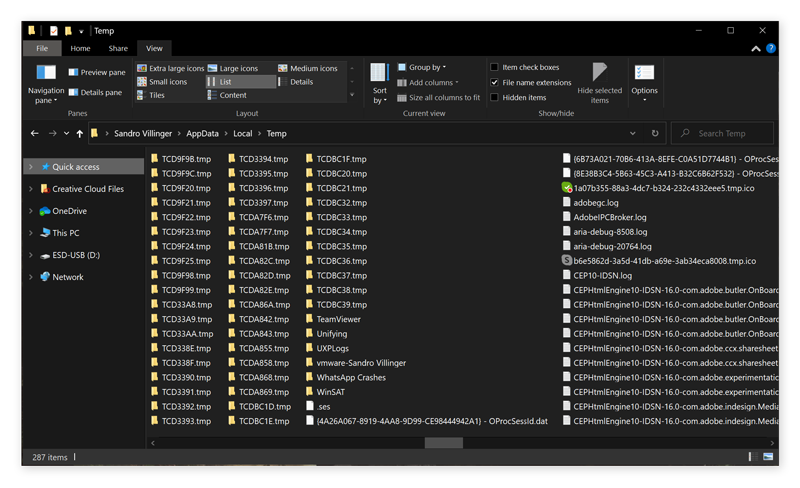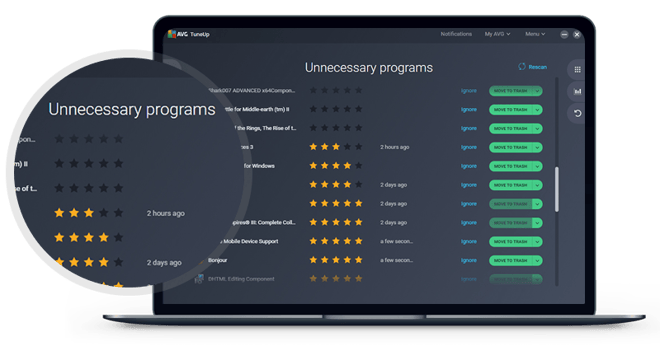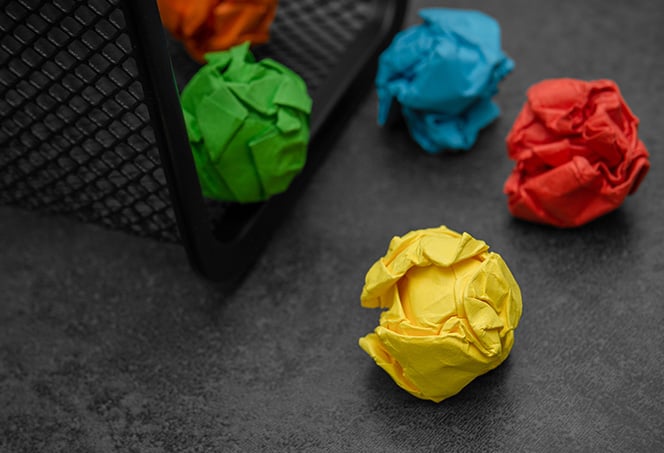What are junk files?
Junk files are temporary files that were created so that your computer or phone could perform a task, such as opening a document, viewing an image, or browsing the internet. These files are useful in the moment, but once they’ve served their purpose they’re just junk — system junk files that clog up a device and cause poor performance.
Having junk files on your computer or phone isn't your fault. They’re inevitable and ubiquitous. Thankfully, they’re not the same as bloatware or a computer virus, but they might slow down your device and impact performance if ignored for too long. That's why it's a good idea to delete junk files regularly.
An excess of junk files is one of several reasons why your PC gets slower over time or why you might suffer 100% disk usage in Windows 10. Nearly anything you do on your computer requires your system to create a temporary file. But that file is needed to install, run, or execute your request only at that very moment. Once that step of the process is complete, the file is no longer needed and turns into computer junk.
The problem is that these files sit on your device in their original form, taking up space and slowing you down. Sometimes these temporary files improve the user experience, such as browser cache files that help load frequently visited web pages faster, or keep your shopping cart full while you’re browsing an ecommerce site. But, in general, it's best practice to regularly clean your browser and delete your browser cookies for optimal performance and safer internet surfing.
Different types of junk files
Computer junk files and phone junk files are created for many different reasons. For example, when you work with Photoshop it will create a temporary file while you're editing photos. But sometimes it forgets to delete these temporary files and they begin to accumulate. Another example is Microsoft Office, which creates a lot of log files for actions you perform or things that went wrong, such as crashes. Unless you're an expert, you don't need these files remaining on your hard drive.
Examples of junk files on your computer
So what are junk files on my computer? The most common types of junk files on your computer can be classified as one of the following:
 Temporary internet files — more commonly known as browser cache — are files created automatically by your computer to load websites you've already visited more quickly, especially multimedia sites with lots of videos and audio files.
Temporary internet files — more commonly known as browser cache — are files created automatically by your computer to load websites you've already visited more quickly, especially multimedia sites with lots of videos and audio files.
 Temporary system files are used to make certain essential features or functionality work, but they become obsolete after their work is done.
Temporary system files are used to make certain essential features or functionality work, but they become obsolete after their work is done.
 Downloaded program files are created to install applications or programs on your device. They’re essential to make the program run initially but then become useless.
Downloaded program files are created to install applications or programs on your device. They’re essential to make the program run initially but then become useless.
 Thumbnails are image preview files that help load the image more quickly when viewed more than once. Once deleted, an image might take longer to load the second time around.
Thumbnails are image preview files that help load the image more quickly when viewed more than once. Once deleted, an image might take longer to load the second time around.
 Recycle bin files are files that have been temporarily deleted but remain stored on the device. The recycle bin feature allows users to second guess anything they delete, either intentionally or accidentally. After recycling something, you can still retrieve it if needed.
Recycle bin files are files that have been temporarily deleted but remain stored on the device. The recycle bin feature allows users to second guess anything they delete, either intentionally or accidentally. After recycling something, you can still retrieve it if needed.
 Improperly removed programs and their related materials stick around even after you uninstall them. You can put an app in the trash or uninstall a program, but you might miss other remnants like temporary files or installation files.
Improperly removed programs and their related materials stick around even after you uninstall them. You can put an app in the trash or uninstall a program, but you might miss other remnants like temporary files or installation files.
What are junk files on my phone?
Junk files on your phone operate in much the same way as they do on your computer. Just as your computer browser stores temporary internet files on your computer, your phone and mobile browser creates and stores this internet junk as well. Junk files are also created by the apps you use.
The most common types of junk files on your phone include:
-
Temporary app files are used to install apps, but they’re useless after installation is complete. Once the app is installed, these files are no longer needed to make the app run smoothly.
-
Invisible cache files are the same thing as temporary internet files, used by apps or the system itself.
-
Untouched or unused files are disputable junk files. Unlike most system junk files that are automatically created, untouched or unused files are simply forgotten and take up space. It's good to be aware of these files and delete them from your Android device periodically.
-
Thumbnails or thumbnail photos are placeholders for multimedia content or full-size photos, but their reduced file size is also often just a waste of space.
-
Trash files are the same thing as your recycle bin files on a PC — they represent a second chance at retrieving items before they become permanently deleted.
Are you constantly trying to free up space on your Android device (aren’t we all)? AVG Cleaner for Android does just that. Plus, it extends your battery life and speeds up performance. And it even identifies resource hogs so you can decide if a particular app is really worth the battery drain. Download AVG Cleaner for Android today and free up tons of space for the files you actually need.
How do I find junk files?
You can find some junk files by searching for them manually on your computer or phone, but they’re often hidden inside countless invisible subfolders across your PC or phone hard drive. Even for the true geeks out there, it's practically impossible (and certainly extremely time-consuming) to find all of these temporary files and folders and delete them.
 An example of temporary junk files hidden on your computer's hard drive.
An example of temporary junk files hidden on your computer's hard drive.
And even if you do manage to delete them, new ones continue to pop up. It’s worth noting that some junk files, like temporary internet files, can be found and deleted by clearing your browser cache.
But the much simpler and more thorough fix for junk files is to use a dedicated cleaning tool. Because junk files are automatically created for most actions you initiate on your device, they’re unavoidable and persistent. Almost every online interaction you make through the course of a normal day leaves a trail of digital crumbs for advertisers and others who use that information to track and target you.
AVG TuneUp features a built-in browser, cache, and cookie cleaner that will regularly and automatically scan your machine to clean up junk files on your browser and in your cache, as well as other program and system leftovers. And, crucially, it will wipe away any cookies that advertisers use to track your behavior on the web.
All that junk built up from using Chrome, Safari, or Edge is gone in an instant. Installer files, old backups to temporary systems files that have long ago served their purpose, and all kinds of other junk are found and removed with AVG TuneUp and its built-in browser cleaning tool.
Is it safe to delete junk files?
Yes. It is safe to delete junk files. Remember, junk files weren't always junk files. At one point in time, they were simply files. Useful files that supported a specific task. Once that task has been fulfilled, those files are obsolete and should be deleted.
You can always recover deleted files in Windows. So if you do delete a junk file that you later decide you want, you can recover it. But there’s almost never a reason to recover junk files. Also, because junk files are triggered by common actions such as web browsing and program installation, these necessary files will simply be recreated whenever your device needs them.

How to remove junk files from your device
There are several easy ways to delete junk files from your computer or phone.
-
Delete temporary files. Most junk files are temporary. Target these first, with the top 3 ways to clean temporary files from your computer.
-
Get rid of unnecessary apps. Find and delete bloatware, and get rid of unneeded apps that you never use or didn't even know you had.
-
Perform a disk and browser scan. This is the fastest and most thorough approach to regularly removing junk files from your device. Use an automated tool such as AVG TuneUp.
AVG TuneUp makes removing junk files safe and easy. It’ll quickly locate your unneeded files and other bloatware along with old apps and programs you no longer use. Then, you can get rid of it all with just a few clicks. You can also choose your preferred cleaning frequency settings — every day, every seven days — and sit back and let AVG TuneUp do the rest.

Junk files are persistent, so an automated cleanup tool works wonders to make sure your device is regularly taken care of. Another priceless feature of AVG TuneUp is Sleep Mode, a built-in optimization tool that identifies resource-hogging applications and lets you put them to sleep until you actually need them. With AVG TuneUp, everything stays within your control and your machine will run like new.
How do I stop junk files from coming back?
Junk files are unavoidable, unfortunately. But you're not doing anything wrong by getting junk files on your device in the first place. They’re inseparable elements of using a computer or phone and only become junk once they've served a purpose.
The best approach is to practice good computer hygiene. Junk files become harmful to your device only when they start accumulating. As long as you regularly clear your browser cache and find and remove your unneeded temporary files, you’ll be fine.
Remove junk files easily with AVG TuneUp
Better yet, let AVG TuneUp do the heavy cleaning lifting for you. Don't let piles and piles of junk files bog you down — discover tons of extra drive space you never knew existed. Fall back in love with your device like you did when you first took it out of the box. All it takes is a bit of tender loving care — and AVG TuneUp — and your device will be running like new.

 An example of temporary junk files hidden on your computer's hard drive.
An example of temporary junk files hidden on your computer's hard drive.





